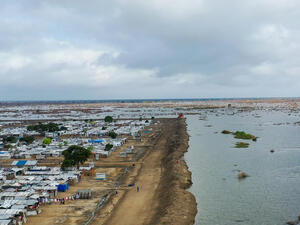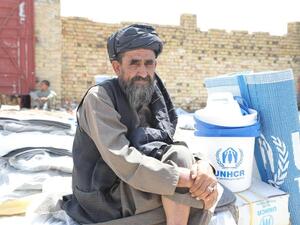Food aid crisis
Food aid crisis
As African ministers and donor country representatives gather in Geneva for the start of the Dialogue on Voluntary Repatriation and Sustainable Reintegration in Africa opening on Monday, refugees across the Horn and East of Africa are experiencing a grave cut in rations due to a lack of contributions to the UN World Food Programme's appeals.
Some 600,000 refugees in UNHCR camps across the region rely upon rations provided by the international community. The UN WFP says it urgently needs $48.3 million to feed them through the end of the year.
In his address late last month to WFP's Executive Board in Rome, High Commissioner Ruud Lubbers noted that our two agencies face many shared challenges and the most critical of these is ensuring the regular and uninterrupted supply of food to our beneficiaries.
In many camps in the Horn refugees are already getting much less in their stomachs due to the cut in aid. We are extremely worried about the effects this shortfall will have if it is not addressed immediately. Unless WFP gets contributions soon, more than a hundred thousand refugees will have nothing to eat starting from May. These numbers will more than triple by June unless WFP receives immediate donations.
Food aid is required to meet all our refugees' dietary needs because most of the camps in the East and Horn of Africa are in remote semi-arid desert regions, and the refugees have little or no opportunity to farm, raise livestock, or otherwise provide for themselves. Many of the households are also headed by women, who simply have their hands full looking after themselves and their families.
In Ethiopia, 126,000 refugees have already seen their rations cut to only 1,500 kilo calories per person per day, that's a 30 percent reduction from the standard 2,100 kilo ration. This is affecting the health and nutritional status of the refugee population, particularly children and pregnant and nursing women. This situation is leaving people more prone to illnesses, and they are facing a higher mortality rate in comparison to periods when they receive the normal ration.
A total suspension of food distribution in Ethiopia's mainly Sudanese and Somali refugee camps from May onwards can only be averted if donors act immediately. Immediately means contributions must arrive now to prevent refugees from dying.
We're also concerned that the ration cuts will contribute to renewed tension in some camps, particularly in the Gambella region, which has experienced serious tension between refugees and the local population over the last year.
In Kenya, WFP expects to run out of cereals like wheat flour next month and to exhaust all its food stocks for camps sheltering more than 221,000 refugees by June unless donations arrive. As with the refugees in neighbouring Ethiopia, Kenya's Somali and Sudanese exiles are avidly watching peace talks that promise to bring respite to decades of conflict in the region. The lack of aid at this critical moment is sending the wrong message.
Nearly 100,000 Eritrean refugees still in camps in eastern Sudan will similarly see cereals disappear from their diets beginning from mid-April. As wheat flour and other cereals form the bulk of their meals, this will have grave effects just as UNHCR is working to try to help these people return to their homeland.
The continuing influx of refugees from Sudan's western Darfur region into Chad is similarly creating new demands as more than 100,000 people scattered in remote camps in the east of Chad need dependable supplies of aid after losing much of their food stocks and livestock during their escape to safety.
We have also asked WFP to urgently meet the needs of 6,000 refugees from the Democratic Republic of Congo (DRC) who are living in extremely precarious conditions in the northern reaches of neighbouring Republic of Congo (ROC) and to help 14,000 of the ROC's own refugees settle back into their communities following their repatriation from Gabon and the DRC.
As the High Commissioner said in Rome last week, despite joint inter-agency appeals and joint briefings by WFP and UNHCR to alert donors to impending breaks in food pipelines, some operations - particularly in Africa - have remained poorly funded. He added that the success of our operations ultimately depends on the resources that are made available by our donors and appealed to donors for more resources to ensure that WFP and UNHCR are able to effectively discharge their respective mandates.









